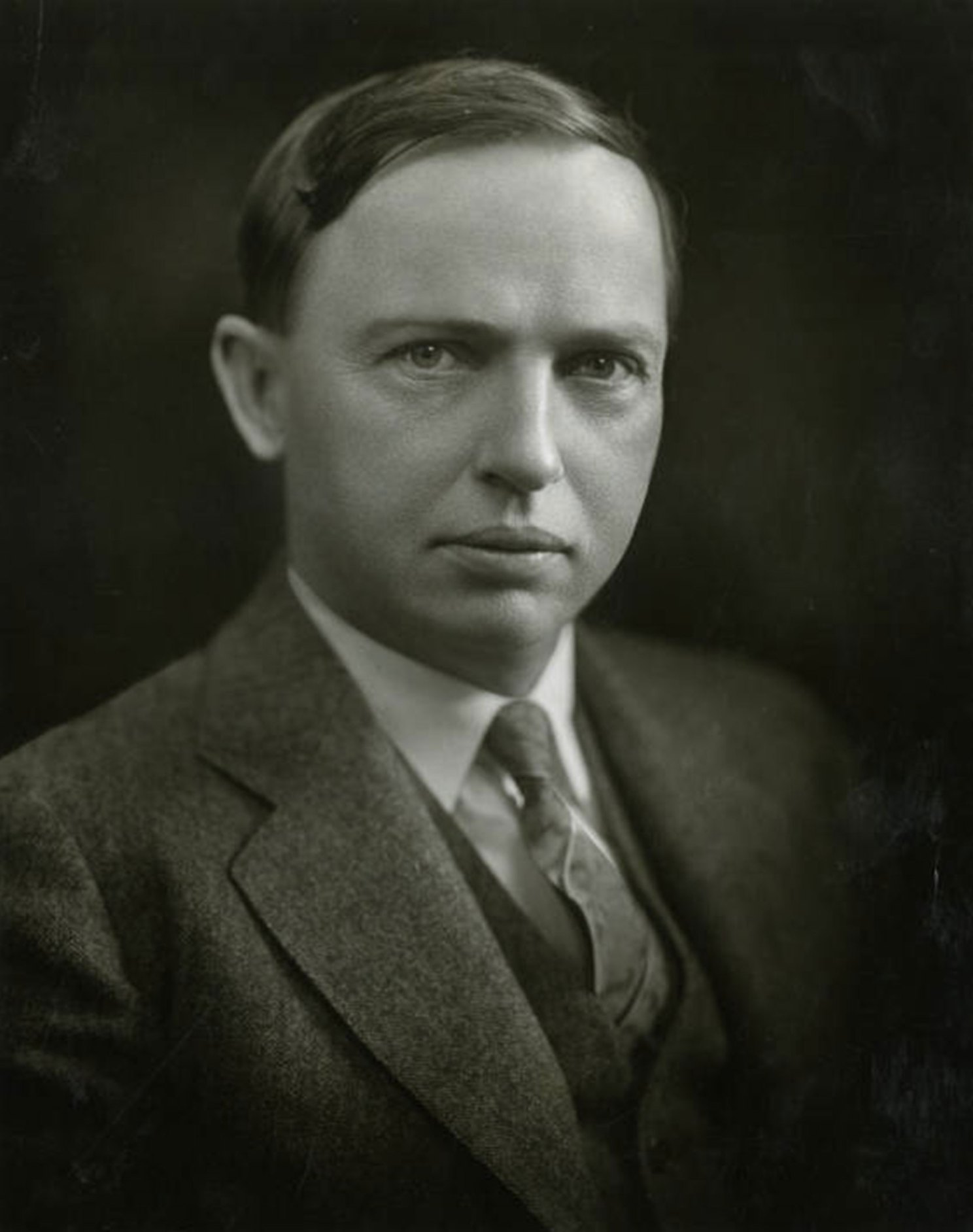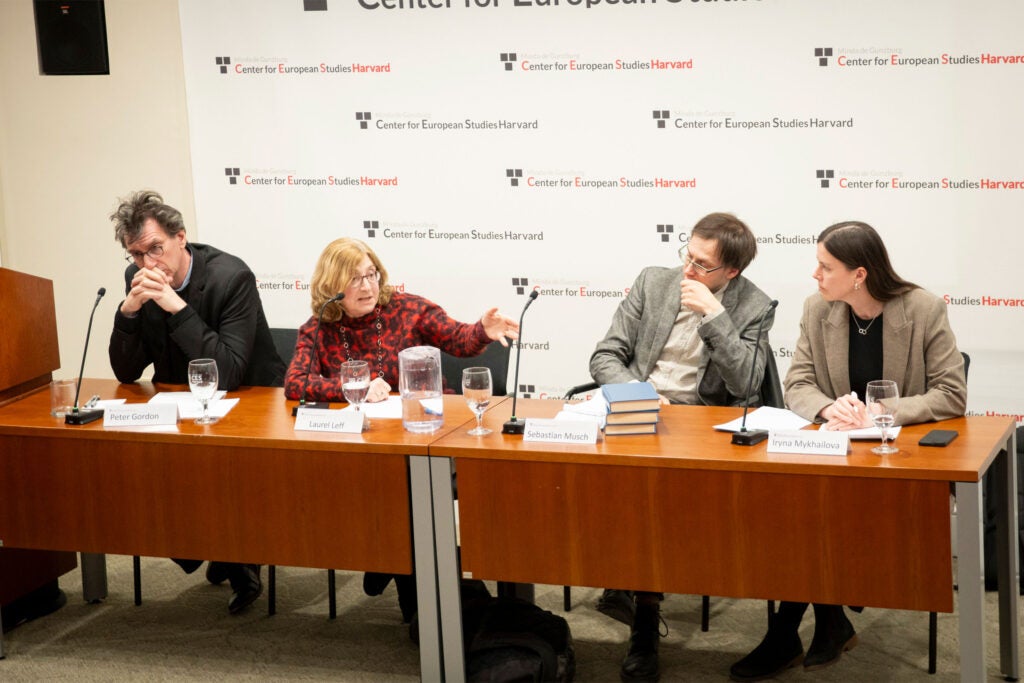
Harlow Shapley, 1946.
Courtesy of University of Minnesota Libraries
Harvard stargazer whose humanity still burns bright
Seminar foregrounds Harlow Shapley, who helped scholars escape Nazi rule
In the 1930s and ’40s, Harvard College Observatory director Harlow Shapley poured great effort into rescuing colleagues from the Nazi terror spreading across Europe.
“These refugee scholars, to be sure, take some of my time from the stars,” the astronomer wrote in an appeal to a philanthropist in 1940. “But the stars will not be of much good to us if we do not preserve the minds with which to comprehend them.”
Shapley turned up repeatedly in a panel held March 21 at the Minda de Gunzburg Center for European Studies. The event, “Refugees (Not) Welcome: European Exile Scholars at Harvard in the 1930s and 1940s,” covered both the indifferent responses of certain top administrators of the era and the more noble actions of Shapley and other faculty members. It was sponsored by the Harvard Colloquium for Intellectual History and moderated by Peter E. Gordon, colloquium chair and the Amabel B. James Professor of History.

“Refugees (Not) Welcome” panelists Peter E. Gordon (from left), Laurel Leff, Sebastian Musch, and Iryna Mykhailova.
Niles Singer/Harvard Staff Photographer
Laurel Leff, a professor of journalism and the associate director of the Jewish Studies Program at Northeastern University, opened the conversation with an overview of how U.S. colleges and universities helped resettle refugee scholars, most of them Jewish, even as the federal government implemented strict immigration limits through the 1930s and early ’40s, with the Hoover and Roosevelt administrations instructing consuls abroad to issue even fewer visas than quotas allowed.
But a special provision existed for professors who planned to carry on their work in the U.S. “The State Department interpreted this provision to require applicants for non-quota visas to have an offer from an American university,” said Leff, whose presentation at the seminar was adapted from her 2019 book, “Well Worth Saving: American Universities’ Life-and-Death Decisions on Refugees from Nazi Europe.”
In 1933, with the en masse firing of Jewish academics in Germany, the Emergency Committee in Aid of Displaced German Scholars was formed to assist with placements at U.S. universities. Harvard President A. Lawrence Lowell declined to get involved, but his successor, James B. Conant, opted for what Leff called “a delicate dance,” privately expressing antisemitic views while nonetheless hiring 45 displaced scholars during the next 12 years.
“That, I think, is due to the efforts of certain members of the Harvard faculty who were very dedicated,” Leff said. In addition to Shapley, who helped academics across disciplines land roles far beyond Harvard, she highlighted the efforts of Harvard Medical School Dean David Linn Edsall and political scientist Carl Joachim Friedrich.
Iryna Mykhailova, who organized the panel, delved deeper into Shapley’s life and actions. A historian of Renaissance philosophy, Mykhailova recently completed a two-year term as a Marie Skłodowska-Curie Global Fellow at Harvard. Her research on German-Jewish exile philosophers took her to the Harvard University Archives, where she immersed herself in Shapley’s letters.
Along with pressing academic leaders nationwide for a coordinated rescue plan, Shapley kept a list of scholars needing help, including Richard Kroner, Gotthard Günther, and other philosophers.
“It was impossible to bring all of them to Harvard,” explained Mykhailova, who plans to publish her findings in an essay. “But eventually Shapley managed to find jobs for almost every philosopher on his list.”
Osnabrück University lecturer Sebastian Musch, currently a Star Fellow at Harvard’s Center for Jewish Studies, spoke to the intellectual trajectory of Werner Jaeger, a classicist born to Protestant parents in northwest Germany. The conservative scholar was not in immediate danger but emigrated in 1936 after realizing “the futility of his attempts to come to terms with the new regime,” said Musch, a specialist on German-Jewish and Holocaust Studies.
Jaeger, whose wife had Jewish heritage, received a warm welcome in the U.S., with several prestigious appointments before he landed at Harvard in 1939. Musch quoted from writings before and after that trans-Atlantic move, which inspired fresh thinking on Judaism’s place in the ancient world — with Jaeger eventually surfacing what he saw as important associations with Greek traditions.
But it was Shapley who remained the central figure in the seminar. Mykhailova struck the perfect closing thought in calling for more attention to the Harvard astronomer’s humanitarian efforts. “I hope someday we will see more studies on this remarkable man,” she said.




